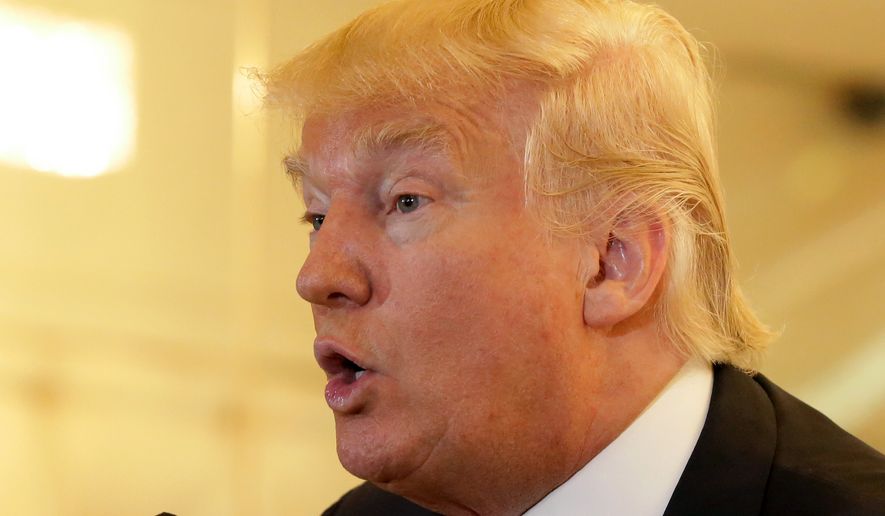OPINION:
While closing out his rivals in the Republican primary elections, Donald Trump has also given new life to some “outsider” national security proposals and opinions. For example:
• The prospect of a cooperative nuclear arrangement with Japan could add stability to Asia and deter North Korea, whereas the failed “Six-Party talks” have been a colossal waste of our time, energy and money.
• The best way to discourage illegal immigration is to tax the many billions of dollars in “remittances” to Mexico and other problem countries, and the money could be used to build a wall or for other border security measures.
• Americans are tired of the Bush-Clinton-Bush-Obama political matrix because there is little perceived substantive difference between them — especially in national security matters.
• The protracted war in Iraq was simply the wrong response to Sept. 11, 2001, and a colossal failure of U.S. national security policy, setting loose a dangerous chain of events, giving rise to the Islamic State and causing implosion of the entire region.
This last point is perhaps most responsible for the bad blood between Mr. Trump and the Bushes — and also probably led to the infamous “war on the rocks” letter that took gratuitous personal shots at Mr. Trump, and which was signed by 122 so-called “Republican national security leaders.”
Many, if not most other Republicans, conservatives and national security experts of all political persuasions wondered: Why would a professional person write — or sign — such a vitriolic letter? What could they have been thinking? The reasons seem politically motivated:
The signers of the letter (some were senior George W. Bush political appointees) probably thought that Jeb Bush would win the primary battle and nomination, and were simply posturing for jobs in another Bush administration.
Some of the signers were themselves complicit in the Iraq War policy planning debacle — hence were also “offended” when Mr. Trump criticized the Iraq War. This was their war, too.
This dynamic also explains, partially, why Mr. Trump has been somewhat estranged from the Republican Party establishment, because the Iraq War was also their war, insofar as they “bought it.” At the same time, the war — especially the “democracy” policy part of it — was particularly painful for many older Republicans and conservatives. This was because their hard-earned Reagan-era reputations — that they were especially skilled in national security policy matters — was blown asunder during the George W. Bush administration.
The Bush family, of course, did not sign the “war on the rocks” letter. However, patriarch George H.W. Bush has been very critical of both Dick Cheney and Donald Rumsfeld for not adequately supporting George W. Bush. And Jeb Bush has already said that he will not vote for Mr. Trump. Perhaps responding to this blame-shifting and snub, Mr. Cheney has now endorsed Mr. Trump — and many would not be surprised if Mr. Rumsfeld did.
That’s the first part of this unusual political matrix. The second part becomes clear when one takes a closer look at the national security-foreign policy “organization” that has been assembled for Mr. Trump. However, and in this context, it may be the case that Mr. Trump has, so far, not had major involvement in this effort. This because he needs to be focused primarily on winning primaries, the nomination and defeating the Clinton political machine in November.
Nevertheless, assuming that none of the 122 “war on the rocks” letter signers can ever be trusted by Mr. Trump to do anything for him in any capacity — one still expects to see a name or two at the top of his national security-foreign policy masthead. A name that has recognition and standing among national security professionals, even when policy differences might divide them.
However, it is important especially for the “Inside the Beltway” types to understand that Donald Trump may well see — as described recently by White House spinner Ben Rhodes — the entire Washington national security-foreign policy establishment as an amorphous “blob,” and one reported on by 27-year-old media “know nothings.”
In fact, how could anyone fault Mr. Trump if he viewed that establishment as a “blob”? After all, they haven’t exactly distinguished themselves since Ronald Reagan was here, and that’s been a long time ago.
A key question: Can this somewhat awkward interim situation somehow self-correct, and will we see a person or persons of stature appointed by Mr. Trump to lead his national security and foreign policy teams?
The sooner this happens, the better — for two very important reasons: First, Mr. Trump’s “outsider” national security-foreign policy approaches need some “legs,” and second, these two basic leadership components are critical for the rest of the campaign.
• Daniel Gallington served in senior national security policy positions for Secretaries of Defense Caspar Weinberger and Donald Rumsfeld, in the Department of Justice for Attorney General Janet Reno, and as bipartisan general counsel for the U.S. Senate Select Committee on Intelligence.




Please read our comment policy before commenting.